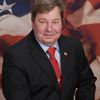Ryan Tate
Elections and appointments
Education
Personal
Contact
Ryan Tate (Republican Party) ran for election to the U.S. House to represent Washington's 10th Congressional District. He lost in the primary on August 4, 2020.
Tate completed Ballotpedia's Candidate Connection survey in 2019. Click here to read the survey answers.
Biography
Ryan Tate was born in Bremerton, Washington. He earned a bachelor's degree in international political economy from the University of Puget Sound in 2011. Tate’s career experience includes working as a software engineer.[1]
Elections
2020
See also: Washington's 10th Congressional District election, 2020
General election
Nonpartisan primary election
Watch the Candidate Conversation for this race!
Withdrawn or disqualified candidates
2020
Ballotpedia survey responses
See also: Ballotpedia's Candidate Connection
Ryan Tate completed Ballotpedia's Candidate Connection survey in 2019. The survey questions appear in bold and are followed by Tate's responses.
Expand all | Collapse all
My name is Ryan Tate. I was born in Bremerton, Washington and graduated from the University of Puget Sound in 2011 with B.A. degrees in International Political Economy and International Business with a minor in Chinese. I am married and live with my wife, Kelsey, in Tacoma's McKinley-Hilltop district for the past 5 years. I currently work as a senior software engineer for a financial technology startup writing software for commercial and central banks. My experience writing software for banks has provided me with insights into the structure of our banking sector and the inefficiencies therein. One of my key policies if elected will be to reform our banking sector, starting with the prioritization of a new Federal Reserve payments and settlement system (FedNow), which I believe will provide the U.S. Federal Reserve new monetary policy tools to stimulate our economy and distribute capital directly to our productivity segments, such as small businesses. By focusing on our monetary policy mechanisms, the U.S. has more tools to responsibly manage our fiscal spending for vital programs our country needs. These programs include student loan reform, housing stimulus, small business lending, balance of payment imbalances (i.e. trade deficit with China), infrastructure expenditures, and much more. By focusing on our sovereign debt and credit markets, we have much greater control over our fiscal expenditures, risk management and taxation policies. Long Live America, Long Live Democracy!
The U.S. Federal Reserve is falling behind our foreign counterparts in technological solutions. Banking sector reform is vital to bring greater efficiencies to our domestic capital markets, and ensure our sovereign debt markets remain strong and the U.S. dollar remains as the reserve currency of the world.
Our balance of payments and trade deficits with our foreign neighbors cannot be solved solely by trade agreements using tariffs. Monetary policy action is required to ensure our economy is able to compete in the global market, whereby other foreign powers (e.g. China) have historically had closed capital accounts to debt markets, keeping their export goods relatively cheap compared to more open economies.
- The federal minimum wage needs to be increased. Currently, the states with minimum wages at the federal level ($7.25/hr) have the highest poverty rates in the country. Germany, Japan and the U.K. all have hourly wages at the equivalent of $9/hr. Corporations were given a 14% tax cut with the expectation that they would increase wages. Instead, they repurchased stock. Net profits (after tax) of all U.S. companies in 2019 is on-course to be around $8 trillion. U.S. companies have the ability to pay their employees a living wage, and we must demand this to ensure our payroll taxes that fund Social Security benefits are able to meet the demographic demands in the next 20 years.
I am most passionate about our economic public policies, both monetary and fiscal policies, which I believe have significant impact in the other areas of public policy. This includes the tax revenues collected, and the expenditures the government makes on health care, infrastructure, education and more. I believe the U.S. economy is the largest economy in the world due to its mixed-market structure. While imperfect, I believe capitalism and free markets are the best allocators of capital in the long-run. However, I also believe that the government has a role to play in ensuring that profiteering does not run rampant to the point that the middle class in unable to earn a living wage and pay for basic needs. By setting the boundaries and rules to the market, such that we can avoid the pitfalls of other lessons learned in history, the U.S. can continue to grow and beat our expectations for what we believe is possible. The course of the U.S. economy depends upon the passing of legislation that sets aside partisan beliefs and focuses on the solutions that will drive our economy forward. Many individuals want progressive policy reforms, but the questions often come down to, "how do we pay for it?" or "who will administer it?". It is at this juncture that policy solutions are needed. We need better cooperation with private industry in the government, more fiscal responsibility by our governments and we need to prove that the government can effectively administer these policies.
I would recommend Milton and Rose Friedman's 1980 "Free to Choose: A Personal Statement" for better understanding my political philosophies. Friedman's main argument is that free markets and limits of government interference leads to the best outcomes for a nation's prosperity. I generally agree with this principle. I generally agree that too much government regulation and interference leads to misallocations and lost opportunities. However, like Friedman, I also recognize that there is some role of government. One of my most controversial arguments is that we need to raise the federal minimum wage to $20 per hour. Most people I share this position with find it unbearable, despite annual net profits of U.S. corporations reaching in excess of $8 trillion in the last decade. Yet, when observing the states that do not have a higher minimum wage greater than the federal limit, we find that those states are among our nations most impoverished. Friedman's concern with an ever larger and overbearing government was the inevitable collusion of government and industry that lead to inefficiencies, in which government needed ever more regulation to circumvent. This cycle occurs ad nauseam to a degree in which the government continues to spend more to regulate more, all the while failing to fix our fundamental problems that gave rise to the original problem. A smaller government allows the market to find a natural equilibrium. Now, the challenge we face today is that we're in an ever more globally connected world competing in markets that have raced to the bottom, where the workers of those countries may have no other choice but to work below living standards. In good faith, I can't make the argument that the government has not contributed to the net increase in living standards, however, in the meanwhile I do question whether the U.S. has remained as competitive as our foreign counter parts who have embraced free market principles. I recommend Friedman as a thoughtful read.
I am a student of the great recession. I entered the University of Puget Sound in 2007 declaring my major in International Political Economy, International Business and Chinese. The following year I remember sitting in an economics class and hearing the news that Lehman Brothers filed for bankruptcy, triggering the beginning of the global financial crises.
It shifted my focus from legal studies into our banking sector, financial markets and monetary policy. In 2009, I studied abroad in China and witnessed a different economic miracle taking place and compared China's political-economic system to the United States'. Nearly ten years later, we are witnessing the trends I had bear witness to then take precedence in our foreign policy and economic markets today.
I believe my educational studies, work experience as an investment analyst in emerging markets and my skillset as a software engineer in financial services uniquely provide me the analytical problem solving qualities needed to be a successful representative in perspective of the contemporary challenges our Union faces today and solutions our country needs for tomorrow's prosperity. I would like to return our country back to a balanced federal budget, in which our future economic prosperity is not compromised by the government spending of today. As I mentioned previously, ~8% of our federal expenditures is spent on servicing interest on previously issued government debt to make up the difference in government spending and revenue shortfalls collected from taxes in the past. If I were able to help draft and pass legislation that would introduce new mechanisms for distributing and managing government benefits which reduce the bureaucratic inefficiencies in our current system and utilize more of our current tax revenue, that would be an excellent legacy. As a software engineer who has used our governmental systems and worked on systems for Fortune 10 companies, I am positive we can develop far better processes to our federal systems. I am also positive we can develop new markets to incentivize private industry to contribute and invest more in the development of America.
While at Rancho Buena Vista High School in Vista, CA, I had the opportunity to intern for California State Assemblyman Mark Wyland and U.S. Congressman Darrell Issa during the school year. It was Congressman Issa who encouraged me to study Mandarin Chinese and piqued my interest in federal politics. During this period, I started studying Mandarin Chinese at night classes at Palomar Community College while still in high school. After graduation I attended the University of Puget Sound, pursuing a degree in international political economy, international business and a minor in Chinese. In 2009, I traveled to Taiwan and China to continue my studies in Mandarin and eventually wrote my senior thesis on China's informal credit markets and banking sector. When I returned from studying abroad in China and while a senior at the University of Puget Sound, I was accepted as an intern at Russell Investments in Seattle, WA to their Global Index reconstitution team, evaluating Chinese and Southeast Asian company financial reports for their global index weighting. When I graduated in 2011, I went to work for George Russell's private family office, Threshold Group in Gig Harbor, WA, as an investment analyst covering asset managers in the emerging markets. While at Threshold Group, I oversaw roughly $300 million assets under management managed by emerging market asset managers. Threshold Group was technically my first professional job, and it had a profound impact on my understanding of global financial markets. It was also special since George Russell helped grow Russell Investments into a billion dollar company and was a major influencer in emerging markets through the Russell 20-20 program. I worked at Threshold Group for 1 year and 4 months before transitioning my focus toward financial technology and software, which I currently work as a senior software engineer for M10 Networks, Inc. writing commercial and central bank software.
The U.S. House of Representatives determines the discretionary spending of the federal budget and introduces legislation that will help enact policies that would enable the federal government to balance the budget. These powers come with great responsibilities, and it makes the U.S. House of Representatives a unique institution among our federal, state and local governments. Roughly 55% of all government spending is spent by the federal government. Ensuring that we elect representatives that understand the context and duties of the office is important so we do not pass legislation that further increases our budget deficit. If we elect representatives who believe the debt ceiling or budget deficit does not matter, I am concerned that those decisions will result in a future scenario where our government is unable to pay its debt obligations and will end up destroying the trust in and demand of our government bonds. If this were to happen, it would result in the U.S. dollar no longer being held as the global reserve currency and would significantly impair our economic position in the world.
The United States federal government spent $363 billion (roughly 7.9% of the total budget) servicing the interest on our sovereign debt in the 2019 fiscal year. The debt issued is a result of our federal government running a budget deficit, meaning that it is spending more money than it is collecting through tax revenue. It is expected that before 2030, the amount of interest paid on government debt will double. While the U.S. Federal Reserve is the single largest holder of U.S. Treasury Bonds, foreign governments and pensions also purchase our Treasury Bonds. The U.S. sovereign debt market is the largest sovereign debt market in the world and many institutions consider it to be one of the safest markets in the world, as the U.S. government has never defaulted on its debt obligations. The concern, however, is given the amount of spending that is required to sustain and stimulate our economy, how will the U.S. federal government be able to afford the costs of our mandatory and discretionary projects while not increasing our budget deficit. The U.S. government has significant expenditures it will need to make over the next two decades (e.g. $5 trillion on upgrading our energy grid), and it will require spending and taxation reform to balance our federal budget. It will require monetary policy action that works in conjunction with fiscal policies, and not against. Meanwhile, we need to ensure our economy remains competitive in the global market and our debt markets remain solvent. Reducing the amount the federal government spends on servicing the interest on our treasury bonds will redirect that spending to vital areas of our economy. But this can only be achieved through a balance budget, less we run the risk of issuing more debt to pay for the interest on previous issued debt. This scenario will lead to the a spiraling of our federal spending and will balloon the money supply to pay for yesterday's expenditures at the expense of tomorrow's future.
Despite a representative only being able to serve on two committees, there are a few committees I would have interest being a member of. My first two priorities would be on the "Budget" and "Financial Services" committees. While each committee is important to the state of our Union, I believe that these two committees would allow me to best serve our nation to write legislation that for what I view as our nation's most fundamental challenges. After these committees, my main interests would include the following committees: "Energy and Commerce", "Foreign Affairs", "Science, Space and Technology", "Small Business" and "Transportation and Infrastructure". I am also interested in serving on the "Economic" and "Taxation" Joint committees.
Note: Ballotpedia reserves the right to edit Candidate Connection survey responses. Any edits made by Ballotpedia will be clearly marked with [brackets] for the public. If the candidate disagrees with an edit, he or she may request the full removal of the survey response from Ballotpedia.org. Ballotpedia does not edit or correct typographical errors unless the candidate's campaign requests it.
See also
External links
- ↑ Information submitted to Ballotpedia through the Candidate Connection survey on December 3, 2019
Senators
Representatives
Democratic Party (10)
Republican Party (2)



 = candidate completed the Ballotpedia Candidate Connection survey.
= candidate completed the Ballotpedia Candidate Connection survey.
























 = candidate completed the Ballotpedia Candidate Connection survey.
= candidate completed the Ballotpedia Candidate Connection survey.








